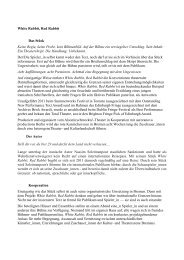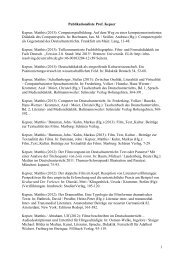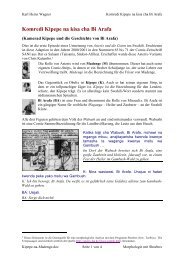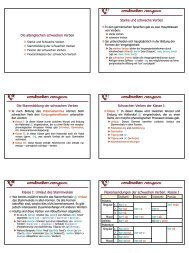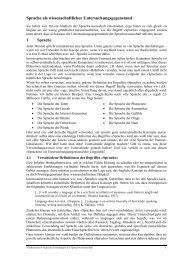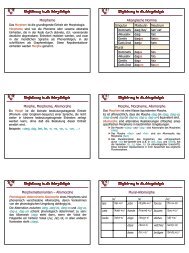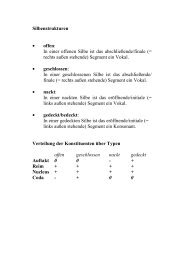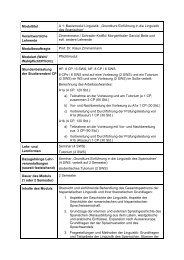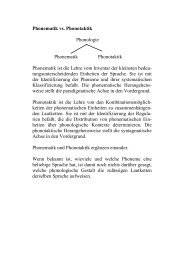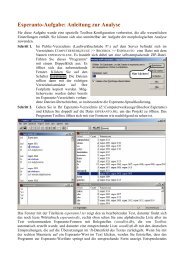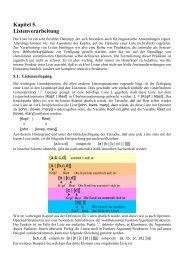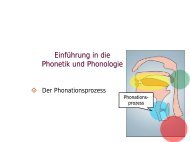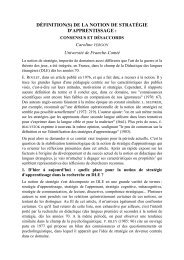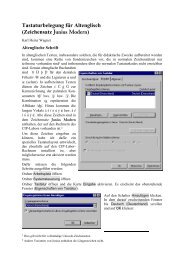Relativism and Universalism in Linguistics - Fachbereich 10 ...
Relativism and Universalism in Linguistics - Fachbereich 10 ...
Relativism and Universalism in Linguistics - Fachbereich 10 ...
Create successful ePaper yourself
Turn your PDF publications into a flip-book with our unique Google optimized e-Paper software.
98 Sections<br />
S to R. Relat<strong>in</strong>g the reported event to the moment of speak<strong>in</strong>g is the basic operation. Relat<strong>in</strong>g<br />
the reported event to reference times which have to be related to the time of speak<strong>in</strong>g is a much<br />
more complex <strong>and</strong> non-basic operation. Despite the typological differences between the three<br />
languages, Bulgarian, Russian <strong>and</strong> German, we can show that the <strong>in</strong>vestigated children <strong>in</strong>terpret<br />
the first formal oppositions <strong>in</strong> the verbal system as represent<strong>in</strong>g aspectual dist<strong>in</strong>ctions, i.e., as<br />
symboliz<strong>in</strong>g differences <strong>in</strong> the relation of the event <strong>and</strong> the time of speak<strong>in</strong>g. Formal<br />
dist<strong>in</strong>ctions which exclusively differentiate dist<strong>in</strong>ct times of reference without chang<strong>in</strong>g the<br />
perception of the reported event emerge after this step <strong>in</strong> grammatical development.<br />
Ant<strong>in</strong>ucci, F. & R. Miller (1976). How children talk about what happened. Journal of Child<br />
Language 3: 167-189.<br />
From Newglish to Offglish:<br />
The system beh<strong>in</strong>d morphological oddities<br />
Hamans, Camiel<br />
Dutch delegation of the PSE Group <strong>in</strong> the European Parliament, Brussels -Strasbourg<br />
hamans@tiscali.nl;chamans@europarl.eu.<strong>in</strong>t<br />
Traditionally morphology deals with complex words, 'words which are not simple signs, but<br />
which are made up of more elementary ones' (Aronoff 1976). Although 'portmanteau' words<br />
such as smog, snark or chunnel are derived from other forms - 'smoke + fog, 'snake + shark'<br />
<strong>and</strong> 'channel + tunnel' - Aronoff does not <strong>in</strong>clude the pattern of word formation <strong>in</strong> his theory<br />
of morphology. These products of blend<strong>in</strong>g processes are just 'oddities'. Bauer(1983), Scalise<br />
(1984), Spencer (1991) <strong>and</strong> Ra<strong>in</strong>er (1993) share the same view.<br />
In the work of Suzanne Kemmer (for <strong>in</strong>stance Kemmer 2000) blends play a more central role.<br />
She considers 'lexical blends, such as glitterati, stalkerazzi, imag<strong>in</strong>eer <strong>and</strong> carjack<strong>in</strong>g, as<br />
<strong>in</strong>stances of one of the most vivid <strong>and</strong> creative word formation processes <strong>in</strong> English'.<br />
However, she realizes how problematic blends are for rule-based theories of morphology.<br />
Therefore she describes the process of blend<strong>in</strong>g with<strong>in</strong> usage-based network theories.<br />
In this paper I want to show how systematic <strong>and</strong> especially productive these morphological<br />
processes are. Therefore we have to <strong>in</strong>clude blend<strong>in</strong>g <strong>and</strong> other ‘odd’ processes, such as<br />
clipp<strong>in</strong>g, <strong>in</strong> a theory of grammar.<br />
I shall start with examples such as:<br />
(1) brunch breakfast + lunch<br />
flumpet Flügelhorn + trumpet<br />
The process under (1) is not very productive <strong>and</strong> at first sight not really systematic, just as <strong>in</strong><br />
examples such as:<br />
(2) governator governor + term<strong>in</strong>ator<br />
Nescafé Nestlé + café<br />
Nespresso Nestlé + espresso<br />
On the other h<strong>and</strong>, examples as the ones under (3) suggests morphological boundaries might<br />
play a role <strong>in</strong> the formation of portmanteau words:<br />
(3) Oxbridge Oxford + Cambridge<br />
stagflation stagnation + <strong>in</strong>flation<br />
<strong>in</strong>fota<strong>in</strong>ment <strong>in</strong>formation + enterta<strong>in</strong>ment



